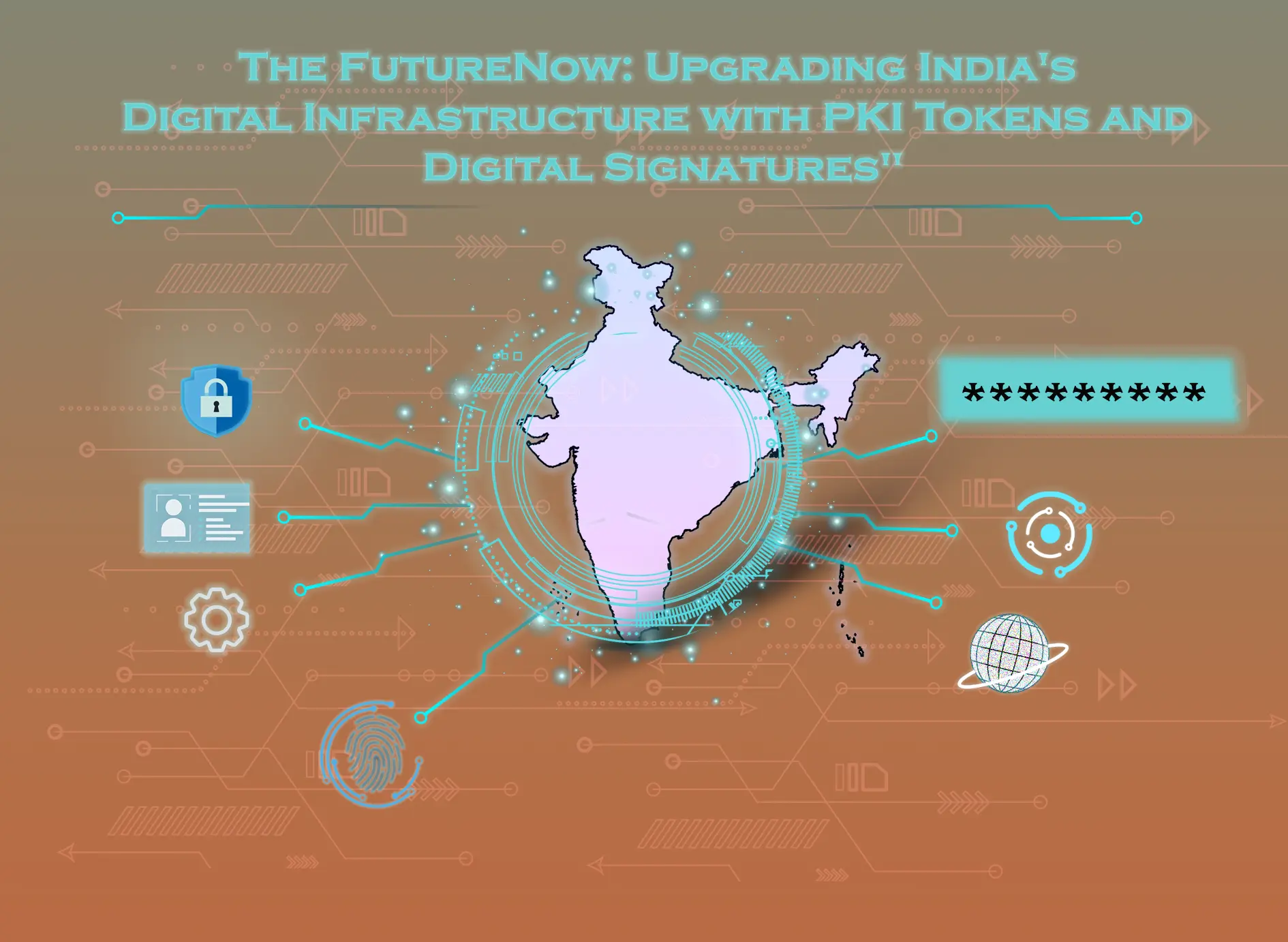The Future is Now: Upgrading India's Digital Infrastructure with PKI/EpassTokens and Digital Signatures
18 September, 2020
The Future is Now: Upgrading India's Digital Infrastructure with PKI/EpassTokens and Digital Signatures

In today's world, digitalization has become a pivotal part of our lives. The Indian government has been making momentous efforts to modernize the country's digital infrastructure to increase the use of digital services. One of the primary components of digital infrastructure is security, and Public Key Infrastructure (PKI) tokens and digital signatures can play a crucial role in this regard.
What is PKI?
PKI is a security framework that enables secure conversation over the internet. It consists of a set of protocols, technologies, and policies that enable entities to securely exchange the information over a network digitally. PKI uses public-key cryptography to encrypt and decrypt data, certifying that only authorized parties can access it.
A. What are PKI tokens?
PKI tokens are physical devices that stores private keys and digital certificates. These tokens are designed to be tamper-proof and can be used to authenticate individuals with secure transactions. PKI tokens can be used in various fileds such as banking, e-commerce, and government services, to ensure a secure communication and data exchange.
PKI tokens are physical devices that store digital certificates and private keys and can be used to authenticate users for secure transactions. In India, there are different types of PKI tokens available in the market.
1. USB Tokens:
USB tokens are the portable and handy devices that can be connected to a system’s USB port. These tokens are designed to easy to use and can be carried around conveniently. They are tamper-proof and offer a high level of security, making them ideal for applications such as online banking and e-governance.
Feitian ePass 2003 Auto, SafeNet USB eToken, and ProxKey WD USB Smart Token are three examples of PKI tokens that are commonly used in India.
a. Feitian ePass 2003 Auto
This is a USB token that is designed for secure digital authentication and digital signature applications. It has an automated key backup feature, making it reliable and secure option for digital transactions.
b. SafeNet USB eToken
This is another USB token that is widely used in India. The tool is designed to store and manage digital certificates with private keys securely. The token is tamper-resistant, making it an ideal choice for high-security applications such as online banking and e-commerce.
c. ProxKey WD USB Smart Token
This is a smart card-based PKI token that is widely used in India for secure digital authentication and digital signature applications. The token has an embedded microchip that provides secure storage and processing of digital certificates and private keys.
All these tokens allow for secure storage and management of digital certificates and private keys with tamper-proof body, making them ideal for high-security applications. The choice of the appropriate PKI token depends on the specific requirements of the application. It is essential to choose a trustworthy and reliable vendor while selecting a PKI token to ensure the security of digital transactions.
B. Types of PKI Tokens in India
Smart Cards
Smart cards are credit-card-sized devices that can be used to store digital certificates and private keys. These cards have an embedded microprocessor that supplies secure storage and processing of information. Smart cards are commonly used in fields such as online banking, e-commerce, and government services.
Mobile Tokens
Mobile tokens are software-based tokens that can be installed on a mobile device such as a smartphone. These tokens are handy to use as they liquidate the need for physical devices. Mobile tokens use two-factor authentication to ensure secure communication and data exchange.
Hardware Security Modules (HSMs)
Hardware Security Modules (HSMs) are physical devices that allow for secure storage and processing of digital certificates and private keys. HSMs are commonly used in high-security applications, such as online payments and banking transactions. They are designed to be tamper-proof and offer a high level of safety.
C. What are digital signatures?
Digital signatures are electronic signatures that provide a high level of security and validity to digital documents. A digital signature is formed using a private key and can be verified using a public key. Digital signatures assure that the document has not tampered and the signer is who they claim to be.
The importance of PKI tokens and digital signatures in India's digital infrastructure
India is rapidly moving towards a paperless economy, and digital transactions are becoming more common nowadays. In this scenario, security becomes a critical concern. PKI tokens and digital signatures can play a dynamic role in ensuring the security and accuracy of digital transactions.
PKI tokens can be used to certify users with secure transactions, preventing unauthorized access and fraud. Digital signatures can ensure that digital documents are authenticated and have not been tampered. This is especially important in applications such as e-governance, where the authenticity of documents is critical.
Conclusion
PKI tokens and digital signatures can play a crucial role in raising India's digital structure. By assuring secure communication and data exchange, these applications can help promote the use of digital services and move India towards a cashless economy. The Indian government proceed to invest in the development of digital infrastructure and warrantee to ensure that the country is prepared for the digital future.